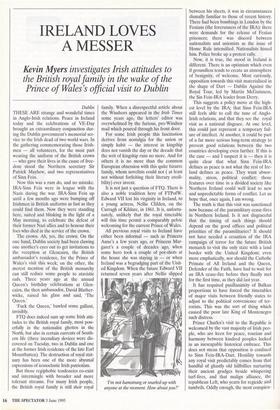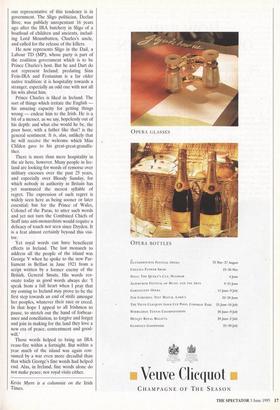IRELAND LOVES A MESSER
Kevin Myers investigates Irish attitudes to
the British royal family in the wake of the Prince of Wales's official visit to Dublin
Dublin THESE ARE strange and wondeful times in Anglo-Irish relations. Peace in Ireland today and the celebrations of VE-Day brought an extraordinary conjunction dur- ing the Dublin government's memorial ser- vice to the Irish dead of two world wars. In the gathering commemorating those Irish- men — all volunteers, for the most part wearing the uniform of the British crown — who gave their lives in the cause of free- dom stood the Northern secretary Sir Patrick Mayhew, and two representatives of Sinn Fein.
Now this was a rum do, and no mistake. IRA-Sinn Fein were in league with the Nazis during the war. IRA-Sinn Fein up until a few months ago were bumping off Irishmen in British uniforms as fast as they could find them. Now they were standing here, suited and blinking in the light of a May morning, to celebrate the defeat of their former Nazi allies and to honour their foes who died in the service of the crown.
The crown. Ah, yes, the crown. On the one hand, Dublin society had been clawing one another's eyes out to get invitations to the reception at Glencairn, the British ambassador's residence, for the Prince of Wales's visit this week; on the other, the merest mention of the British monarchy can still reduce some people to atavistic oafs. Three years ago at the annual Queen's birthday celebrations at Glen- cairn, the then ambassador, David Blather- wicke, raised his glass and said, 'The Queen.'
`Fuck the Queen,' bawled some gallant, invisibly.
FTQ does indeed sum up some Irish atti- tudes to the British royal family, most pow- erfully in the nationalist ghettos in the North, but also in certain currents of South- ern life (three incendiary devices were dis- covered on Tuesday, two in Dublin and one at the former Irish residence of the late Earl Mountbatten). The destruction of royal stat- uary has been one of the more abysmal expressions of iconoclastic Irish patriotism.
But those regiphobic tendencies co-exist and intermingle with broader and more tolerant streams. For many Irish people, the British royal family is still their royal family. When a disrespectful article about the Windsors appeared in the Irish Times some years ago, the letters' editor was overwhelmed by the furious, pro-Windsor mail which poured through his front door.
For some Irish people this fascination derives from nostalgia for the union or simply habit — the interest in kingship does not vanish the day or the decade that the writ of kingship runs no more. And for others it is no more than the common European obsession with this quite bizarre family, whom novelists could not ( at least not without forfeiting their literary credi- bility) ever invent.
It is not just a question of FTQ. There is also a noble tradition here of FrPofW. Edward VII lost his virginity in Ireland, to a young actress, Nellie Clifden, on the Curragh of Kildare, in 1861. It is, unfortu- nately, unlikely that the royal timetable will this time permit a comparably pelvic welcoming for the current Prince of Wales.
All previous royal visits to Ireland have either been informal — such as Princess Anne's a few years ago, or Princess Mar- garet's a couple of decades ago, when some hero took a couple of pot-shots at the house she was staying in — or when Ireland was a begrudging part of the Unit- ed Kingdom. When the future Edward VII returned seven years after Nellie slipped 'I'm not hamstrung or snarled-up with anyone at the moment. How about you?' between his sheets, it was in circumstances dismally familiar to those of recent history. There had been bombings in London by the Fenians (the forerunners of the IRA): there were demands for the release of Fenian prisoners; there was discord between nationalists and unionists as the issue of Home Rule intensified. Nationalists hissed him. Police broke up a protest rally.
Now, it is true, the mood in Ireland is different. There is an optimism which even if groundless tends to create an atmosphere of benignity, of welcome. Most curiously, opposition towards this visit materialised in the shape of Dart — Dublin Against the Royal Tour, led by Martin McGuinness, the Sin Fein-IRA leader from Deny.
This suggests a policy move at the high- est level by the IRA; that Sinn Fein-IRA still feels able to call the tune of Anglo- Irish relations, and that they see the royal visit as a national disgrace. At one level, this could just represent a temporary fail- ure of intellect. At another, it could be part of a far more serious long-term strategy to prevent good relations between the two countries developing even further. If this is the case — and I suspect it is — then it is quite clear that what Sinn Fein-IRA defines as peace is not what the rest of Ire- land defines as peace. They want abnor- mality, stress, political conflict: those features over time in a divided society like Northern Ireland could well lead to new and unpredictable forms of conflict. Let us hope that, once again, I am wrong.
The truth is that this visit was sanctioned now because of the paramilitary cease-fires in Northern Ireland. Is it not disgraceful that the timing of such things should depend on the good offices and political priorities of the paramilitaries? It should not have needed a cessation of the IRA campaign of terror for the future British monarch to visit the only state with a land border with the United Kingdom; even more emphatically, nor should the Catholic Primate of All Ireland and the Queen, Defender of the Faith, have had to wait for an IRA cease-fire before they finally met for the first time, as they did last year.
It has required pusillanimity of Balkan proportions to have forced the timetables of major visits between friendly states to adjust to the political convenience of ter- rorists. This was the sort of thing which caused the poor late King of Montenegro such distress.
Prince Charles's visit to the Republic is welcomed by the vast majority of Irish peo- ple, who are keen for peace, tourism and harmony between kindred peoples locked in an inescapable historical embrace. This does not mean that opposition is confined to Sinn Fein-IRA-Dart. Hostility towards any royal visit predictably comes from that handful of ghastly old hillbillies nurturing their ancient grudges beside whispering turf-fires, and that malign alliance, the republican Left, who yearn for regicide and tumbrils. Oddly enough, the most conspicu- ous representative of this tendency is in government. The Sligo politician, Declan Bree, was publicly unrepentant 16 years ago after the IRA butchery in Sligo of a boatload of children and ancients, includ- ing Lord Mountbatten, Charles's uncle, and called for the release of the killers.
He now represents Sligo in the Dail, a Labour TD (MP), whose party is part of the coalition government which is to be Prince Charles's host. But he and Dart do not represent Ireland; predating Sinn Fein-IRA and Fenianism is a far older native tradition: it is hospitality towards a stranger, especially an odd one with not all his wits about him.
Prince Charles is liked in Ireland. The sort of things which irritate the English his amazing capacity for getting things wrong — endear him to the Irish. He is a bit of a messer, as we say, hopelessly out of his depth: and what else would he be, the poor hoor, with a father like that? is the general sentiment. It is, alas, unlikely that he will receive the welcome which Miss Clifden gave to his great-great-grandfa- ther.
There is more than mere hospitality in the air here, however. Many people in Ire- land are looking for words of remorse over military excesses over the past 25 years, and especially over Bloody Sunday, for which nobody in authority in Britain has yet murmured the merest syllable of regret. The expression of such regret is widely seen here as being sooner or later essential; but for the Prince of Wales, Colonel of the Paras, to utter such words and yet not turn the Combined Chiefs of Staff into anti-monarchists would require a delicacy of touch not seen since Dryden. It is a feat almost certainly beyond this visi- tor.
Yet royal words can have beneficent effects in Ireland. The last monarch to address all the people of the island was George V when he spoke to the new Par- liament in Belfast in June 1921 from a script written by a former enemy of the British, General Smuts. His words res- onate today as good words always do: 'I speak from a full heart when I pray that my coming to Ireland may prove to be the first step towards an end of strife amongst her peoples, whatever their race or creed. In that hope I appeal to all Irishmen to pause, to stretch out the hand of forbear- ance and conciliation, to forgive and forget and join in making for the land they love a new era of peace, contentment and good- will.'
Those words helped to bring an IRA cease-fire within a fortnight. But within a year much of the island was again con- sumed by a war even more dreadful than that which George's fine words had helped end. Alas, in Ireland, fine words alone do not make peace; nor royal visits either.
Kevin Myers is a columnist on the Irish Times.



































































 Previous page
Previous page